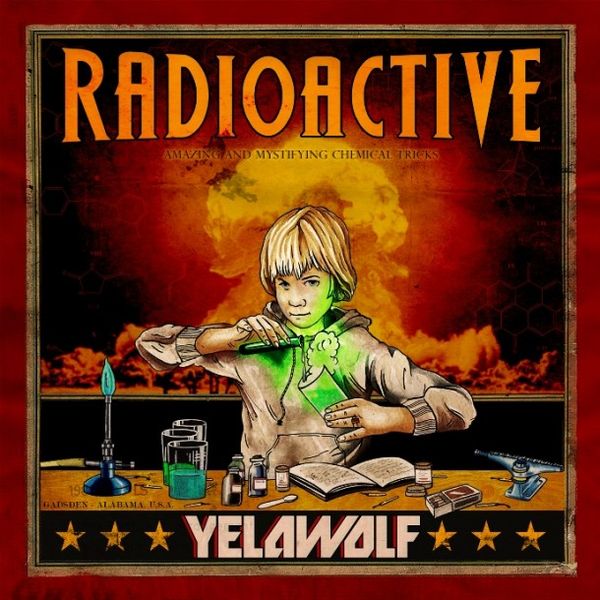Yelawolf sure is a strange fellow. Time was, he wanted to be a skateboarder a la Tony Hawk, but after realizing how much it hurts to be quite that good he seems to have thought, hey, I’ll be a rapper. Hailing from Alabama, many things about Yela are intriguing: for an art form partly grounded in racial tensions, a drunken 30-something that wouldn’t look out of place flying a Confederate flag quickly raised eyebrows. Sure, rap had dealt with white trailer trash before, but this was Southern white trash (Paul Wall is too racially confused to be a ‘hick’ and Bubba Sparxxx was never so flamboyant). It was an interesting concept, and Yela was clearly on his way up, following a scene stealing appearance on Big Boi’s “You Ain’t No DJ.” He was picked up by Interscope and mixtape Trunk Muzik was altered and popped on store shelves. Then the big announcement came: Yela had been signed to Eminem’s rebuilt Shady Records.
While Marshall had been building the mainstream debut of Slaughterhouse for some time, the entrance of Yela was abrupt. Some called the signing an invention of the two’s shared parent label, and many wondered how the kid would fit in with “Shady 2.0.” The posse quickly released “2.0 Boys,” and the answer became brutally evident. Whereas Lil Wayne forged Young Money on flashy personas, Eminem had put his faith in sheer lyricism and talent. Still the question remained, only more apparent than before: how, exactly, would Slim market these guys?
For Yelawolf, the answer should have been relatively simple. Much in the same way Mathers had, the newcomer needed to unleash his persona on the world. The country-boy-meets-rap attitude had the potential to enthrall, at the least, White America. Herein lies the fatal flaw of Radioactive. Unsure of himself and wary of the charts, Yelawolf panders rather than creates. It’s a sad and strange development: sure, developed MCs, such as Em himself, can coast off a big pop chorus, but if the audience isn’t familiar with you, you’re just another voice between the hooks. If it’s a new world, make it notice you. Displayed on the album’s stronger tracks, Yelawolf clearly had a hick rock-n-rolla hit in him, ready made for the droves that buy any dirty South MC’s album to eat up.
Instead, Yelawolf attempts to jump between everything that everyone would want, leaving near anyone looking for something more inspiring – and fitting of his capabilities – in the dust. First single “Hard White” is too club-ready to grace the mainstream charts, while “Let’s Roll” both insists on featuring Kid Rock and is nearly the dullest version of the single Yela should have made imaginable. The beat wants to be something Southern, but its light fluff is too soft for even Yela’s smoother flow. Yela seems to realize it’s by the numbers as he snores through quips like, “A-L-A-B-A-M-A, I’m off / I might pee in a lake / I might go to Talladega and see me a race / and bring me a case.”
This isn’t to say it’s all bad. Rather, Yela seemed to lose his resolve about a third of the way through, as if the bigwigs finally got to him, six songs into recording. It all starts off promisingly, a mock government announcement warning of nuclear attack by North Korea, Yela slowly coming in with his trademark vicious, choppy flow. “Growin’ Up in the Gutter” boasts a jarring, aggressive beat, a solid guestspot from pal Rittz, and a frightening, possessing turn from Yela. It’s these sort of songs that come naturally to the MC, stories of the ‘gutter,’ and it’s these songs that should have composed his debut. It’s unfair to completely dismiss the album as a mess: Yealwolf revealed early on his intent to craft a record that could nearly universally play on the airwaves, with an eclectic mix of reasons as to why, hence the album’s title. The sporadic nature of the sounds found on the album stand by this concept, but the billboard standards fail to inspire.
Yela will likely face a fair amount of criticism for ‘popping out,’ but it’s in the process, not the act, that he stumbled. There’s nothing “wrong” with tracks such as “Good Girl” and “Animal,” they’re simply boring. “The Hardest Love Song in the World” manages to step it up a tad, the lazy groove of its beat fitting for a Yelawolf LP. “Everything I Love the Most” pulls off the same, and producer Willpower, who crafted seven of the album’s beats, deserves some credit to that end. The Justice League helmed “Write Your Name” would sound perfectly at home on Rick Ross’s God Forgives, I Don’t, but is suspect here, the gritty MC just sounds awkward over it, though he deserves credit for keeping the track’s woozy story afloat. On “Radio,” however, Yela simply sounds absurd, attempting to shrilly sing, “YouTube killed the video star.”
With “Slumerican Shitizen,” its strong Killer Mike spot, and the intimate, moving “The Last Song,” Yelawolf manages to conclude things on a high note. In particular, the last track is sure to speak to any listener that dealt with a neglected childhood (apparently becoming the Shady Records standard), Yela repeating a heartfelt “Hope that you’re proud now” of a hook, with blistering lines such as, “Ya see I’ve been lost, ever since I could walk / lookin’ for my daddy and any one of my mamma’s boyfriends who would talk.” It’s on songs like this that the frustrating potential of Yelawolf shines through. This kid may not have the voice of a generation, but there’s certainly a demographic he could mean the world to. Once he figures out that it’s what he has to say that should guide his singles, rather than what he imagines we want to hear, there may well be a great artist in Yelawolf. For now, however, he has a way to go.

